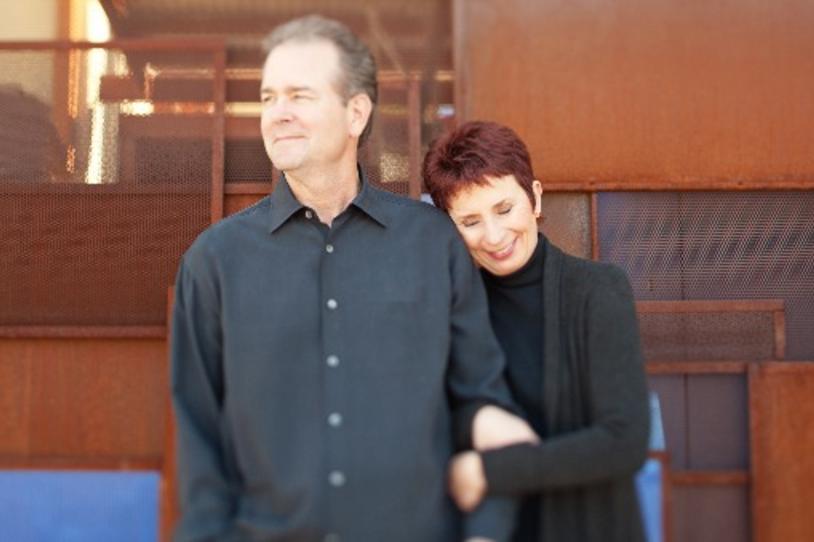
Ava Butler, a member of The Michael J. Fox Foundation community, shares some of the things her husband's diagnosis of Parkinson's disease and Lewy Body dementia has taught her — which she takes to heart at home, and in her career.
I am an organizational development consultant specializing in transformational change. I’m also the wife of my dear Richard. We’ve been happily married for almost 24 years and are deeply in love. But our relationship is a non-traditional one because Richard has Parkinson’s disease and Lewy Body dementia. In January, he moved into a memory care facility. He’s 63 and I’m 57.
Richard was diagnosed with Parkinson’s in 2010, but we’re sure he had the disease long before the diagnosis. We were somewhat prepared to take on the physical challenges of Parkinson’s but utterly ill-equipped to deal with the accompanying dementia. Richard’s decline has been rapid and relentless despite our full scale attempts to do everything possible to stop or even reverse his disease.
Our situation has been devastating, but it has made me an even better consultant and person.
Here are the top 12 things I’ve learned, or re-learned, so far.
1) Watch for early signs of problems.
- It’s easy to dismiss or ignore information that you don’t want to hear.
- Rely on those around you to provide insights. Ask for feedback.
- Listen to what others have to say, regardless if you see it yourself or not.
2) Learn as much as you can.
- Educate yourself, even on topics that you don’t want to learn about at all, and will have trouble understanding. (Editor's note: Learn more about Lewy body dementia here and Parkinson's disease symptoms here)
- Pay attention to the details and don’t be afraid to ask for clarification when people are speaking in language foreign to you.
- Get ready to be an advocate.
3) Get the ‘system in the room’.
- Insist on a cross-functional, multi-disciplinary approach and create opportunities for people with diverse views to hear and learn from each other. This is essential in order to determine the best solution or approach.
4) Plan ahead.
- Last minute changes to your priorities due to unforeseen circumstances are inevitable. Expect and accept them with grace.
- Never wait until the last minute to get prepared. It will add to your stress and the stress of those around you.
5) Plan for all scenarios.
- Most people plan ahead based on predicting a few different scenarios. But few plan for or discuss the most devastating possibilities, and therefore can find themselves in emotionally and financially difficult situations that could have been avoided or diminished.
6) Be flexible.
- Plan to manage current and known future priorities but you must also adapt to your changing environment.
7) Pre-position others beforehand.
- No one likes surprises. Advance communication, sometimes several times, before an event occurs helps individuals prepare.
- Always avoid personal surprises in public places. Never let a person be embarrassed or humiliated due to your actions or inactions. Honor the self-esteem of others.
8) Show compassion.
- Be understanding and know the limitations of others and yourself.
- Listen carefully to maximize your understanding of other’s situations and perspectives.
- Be present in the moment.
9) Focus on the positive.
- Negative feedback, especially when it’s focused on capabilities that another doesn’t have, is counterproductive at best.
- Think about what you and others can do, as opposed only thinking about what you or others can’t do.
- Look for creative solutions to maneuver around obstacles.
- Celebrate even the smallest wins.
10) Take care of yourself.
- As they say on the airplanes “put your own oxygen mask on before helping others”.
- Accept the help of others. Don’t be afraid to ask for help and do so proactively.
- Find joy in your work.
- Remember to breath.
11) Help others.
- Share what you have learned and mentor those in earlier stages of their journey than you are.
- Give freely of your time, and know that your goodwill will be returned.
12) Be grateful.
- Appreciate what others do. Say thank you a lot.
- Treat every day as if it were your last.
- Make a difference every day. Have a positive impact on those around you.
I’m still learning, whether I want to or not. I’ll continue to work to be the best consultant I can be, the best wife I can be, and to become a better person because of it. Transformational change indeed.